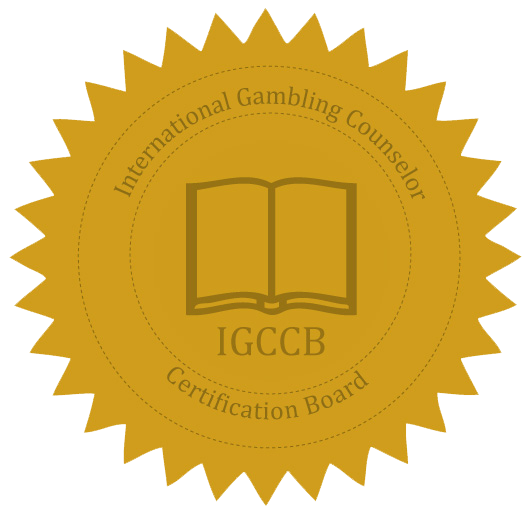International Co-Occurring Gambling Specialist (ICOGS)
The following is an outline of the requirements for certification as an International Co-Occurring Gambling Specialist (ICOGS):
All documentation and evaluations to be completed in our Certemy certification software.
The ICOGS is a credential designed for counselors working with clients who have primary Substance Use and/or Mental Health disorders, and who want to develop a competency in addressing gambling as a co-occurring issue in these populations. The ICOGS is not a certificate of competence in treating gambling disorder as a primary or standalone diagnosis. As such it is not a replacement for or comparable to the ICGC-I or ICGC-II certification
Education
Bachelor’s degree or equivalent license or certification in a recognized behavioral health field (i.e. psychology, addictions, clinical social work)
Training
30 hours of IGCCB-approved gambling-specific or gambling as a co-occurring disorder training and education
Supervisor
Consent and evaluation from on-site clinical supervisor
Forms
Complete application form, ethical statement forms, and directory authorization form
Evaluations
Consents and evaluations from two co-workers
Payment
Payment of $185 via credit card
BACC
Consent and evaluation from Board Approved Clinical Consultant (BACC). A minimum of 4 hours of sessions to be completed with an IGCCB BACC.
* BACC consultation requires a contractual agreement that may also have fees associated.
Experience
100* hours direct contact experience addressing gambling disorder while primarily treating individuals for Mental Health and/or Substance Use Disorders in Board approved setting.
Education & Training:
A minimum of 30 hours of IGCCB-approved gambling and gambling disorder as a co-occurring disorder specific training or education must be completed with appropriate supporting documentation as defined by the IGCCB. The International Gambling Counselor Certification Board requires a Bachelor’s Degree or equivalent (as assessed by the IGCCB) in behavioral health field (e.g., license or certificate in psychology, sociology, chemical dependency, counseling, social work, etc.) to meet the behavioral education requirement for certification. An International/state or other jurisdictional licensure or certification in case management, substance use disorder counseling, mental health counseling or equivalent (as approved by IGCCB) in work experience is required.
Direct Contact Hours:
Minimum of 100 hours as a counselor delivering direct treatment which addresses the impact of gambling and gambling disorder on recovery to clients with substance use disorder or mental health disorders, in a Board approved setting with an IGCCB Approved Clinical Consultant (BACC).
ICOGS Criteria for “Case Consultation”:
Minimum guidelines for approved consultation should include at least 4 hours of clinical consultation. IGCCB clinical consultation maybe done in person, by phone, by email, or as arranged between supervisor and applicant. Applicant may present properly documented past clinical work with gamblers and their family members for consideration by the IGCCB approved clinical consultant, and if accepted by the BACC (Board approved clinical consultant) and the IGCCB, these hours may be credited toward the 100 experiential hours required for ICOGS. These should include a minimum caseload as agreed to with the BACC. Clinical Consultant guidelines will include reporting forms, case presentation guidelines, and suggested minimum caseloads.
DEFINITIONS RELATED TO ICOGS
Direct contact hours include counseling activities addressing the issue of gambling disorder/impact of gambling with clients in primary treatment for Mental Health (MH) and/or Substance Use Disorders (SUD) are defined as:
- Face to face clock hours with MH and/or SUD clients screening, assessing, counseling about gambling problems or the impact of gambling on client’s recovery, or monitoring gambling behaviors
- Face to face clock hours with clients diagnosed with primary or co-occurring gambling disorder
- All hours of documentation addressing impact of gambling on recovery
- Client chart
- E.A.P./employer
- Counselor supervisor
- Referral agents/other mental health workers court/parole/probation officers
- Any lengthy telephone interventions addressing issues of gambling/gambling disorder (30 min. or more, documented).
- Preparation of discharge summaries, evaluations and/or aftercare plans for other agencies or care providers that address the impact of gambling/gambling disorder on recovery.
- Review of cases of clients for which gambling/gambling disorder is an issue in their recovery to medical or clinical director.
- Case management services to managed care providers or utilization review for gambling cases.
- Psycho-educational sessions that address or integrate the topic of gambling.
- Treatment planning sessions with the treatment team that address gambling disorder and/or the impact of gambling on clients’ recovery.
